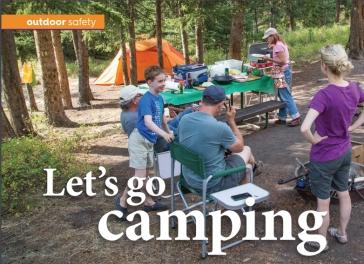
4 minute read
Recreation & Exercise
Photo: Yellowstone National Park/flickr
Enjoying the outdoors starts with safety
Advertisement
BY KEVIN DRULEY
Feeling cooped up? Camping offers a great way to get outdoors. Plus, it’s a relatively safe activity during the COVID-19 pandemic.
But as the public health crisis continues, campers have to make considerations beyond the norm. For example, physical distancing isn’t only for wildlife encounters anymore.
It’s not hard, though. You just need to do some extra research and preparation before heading out, as well as keep traditional camping safety precautions in mind.
“We don’t want people to feel discouraged,” Colorado Parks and Wildlife spokesperson Bridget Kochel said. “We want them to go and recreate and have fun and enjoy everything. But just be mindful of the safety components as well.”
Making your plans Although part of the camping experience is unplugging from modern gadgets and technology, experts say you should check out camping area websites before you go.
The National Park Service website (nps.gov), state parks department sites and individual parks’ social media pages have upto-date information on offerings, closures or restrictions. If your kids were primed to go swimming, for instance, better to prepare them before the trip than after encountering a “NO SWIMMING” sign. Even more important: You wouldn’t want to find out after arriving that the campground’s public restrooms and showers are closed as a safety measure.
“It’s just good to know that stuff before you head out to set the expectation,” Kochel said.
Check the weather forecast for the duration of your stay so you pack adequate clothing, food and water, and other supplies. And ask a family member or friend to be your emergency contact, and then send them your itinerary.
Where COVID-19 is concerned, make sure your research includes monitoring local health department guidelines or travel restrictions. Kochel also recommends eliminating, when possible, the need for stops on your way to the campsite to help limit potential exposure. That means leaving home with a full tank of gas and packing snacks and meals if your trip will be a long one. Experienced campers should keep in mind that camping during a pandemic likely won’t be as communal as past outings. “I think in previous years, camping used to be a way to meet new people, and you’d be able to go into people’s campgrounds and invite them over for a meal,” Kochel said. “In this sense, we’re asking that people really stay within their household bubble.”
Know your limitations Whether you’re a first-time camper or a frontier veteran, make sure the activities you choose are within the abilities of everyone in your group. It’s good to have a backup plan and create contingencies for when to turn around or pack up as situations dictate.
“Know your skill level and physical limits and use good judgment to avoid risks during your visit,” NPS spokesperson Kathy Kupper said. She added that campers should seek and follow advice and warnings provided by rangers or park signage.
Your fire As Kupper notes, “the sights, sounds and smells of a campfire are an enjoyable part of camping.” However, knowing the basics of starting, maintaining and extinguishing campfires is a must. Here’s guidance from the NPS: • Before starting a campfire, make sure your tent, gear or other flammable objects are at least 15 feet away.
• Purchase kindling or wood for the fire near the campground, or collect it from the area, if rules allow.
• Monitor children and pets around campfires.
• Never leave a campfire unattended, and always keep water nearby.
• Douse the campfire and coals with water when you’re ready to leave, and don’t leave until the fire is fully extinguished. If water isn’t available, use a poker or other device to spread the coals, then intermittently stir dirt and sand.
Every park has regulations on where and when campfires are permitted.
Bear in mind “When we’re going into the outdoors, we’re going into our wild neighbors’ areas as well, and so it’s really important to coexist,” Kochel said.
The NPS offers tips to avoid attracting wildlife to your campsite: • Keep food secured in airtight containers and out of reach to avoid unwanted attention from wildlife. Generally, food can be stored in your car, but some campgrounds may require the use of food storage lockers or other means.
• Keep your campsite clean. Collect any food packaging and food scraps in a waste bag and dispose of the waste in the campground receptacle before you leave or turn in for the night.
• Don’t take food inside your tent. Although it’s tempting to have a midnight snack on hand, it will attract wildlife.
It’s important to not feed wildlife. Feeding wild animals can lead them to expect to receive food in the future while making them lose their natural fear of people. Maintain a safe distance while watching wildlife, and keep pets leashed.
“Every single camping experience is different in every single park,” Kochel said. “You’re never going to get the same experience, but with that comes doing a little bit of research so you know what you’re getting yourself into.”
FAMILY SAFETY & HEALTH Summer 2021 familysafetyhealth.com









